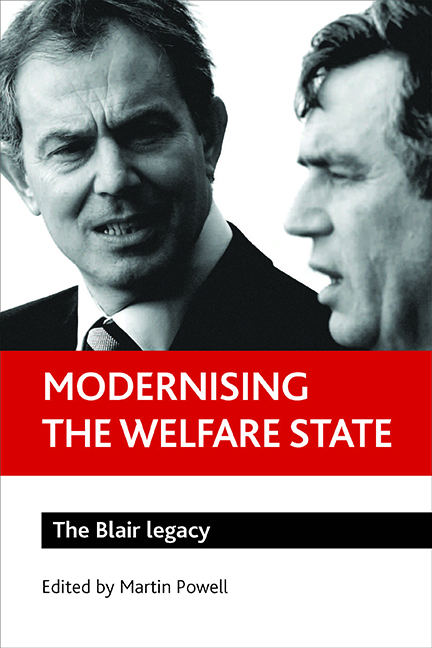Book contents
- Frontmatter
- Contents
- List of tables and figures
- Acknowledgements
- Notes on contributors
- one Introduction: modernising the welfare state
- two The NHS after 10 years of New Labour
- three Housing policy: coming in out of the cold?
- four Social security and welfare reform
- five Social care under Blair: are social care services more modern?
- six Education: from the comprehensive to the individual
- seven Controlling crime and disorder: the Labour legacy
- eight Social investment: the discourse and the dimensions of change
- nine Risk and the Blair legacy
- ten Going private?
- eleven Choice in public services: ‘no choice but to choose!’
- twelve The conditional welfare state
- thirteen The stages of New Labour
- fourteen Social Democratic reforms of the welfare state: Germany and the UK compared
- fifteen Conclusion: the Blair legacy
- Index
- Also available from The Policy Press
three - Housing policy: coming in out of the cold?
Published online by Cambridge University Press: 21 January 2022
- Frontmatter
- Contents
- List of tables and figures
- Acknowledgements
- Notes on contributors
- one Introduction: modernising the welfare state
- two The NHS after 10 years of New Labour
- three Housing policy: coming in out of the cold?
- four Social security and welfare reform
- five Social care under Blair: are social care services more modern?
- six Education: from the comprehensive to the individual
- seven Controlling crime and disorder: the Labour legacy
- eight Social investment: the discourse and the dimensions of change
- nine Risk and the Blair legacy
- ten Going private?
- eleven Choice in public services: ‘no choice but to choose!’
- twelve The conditional welfare state
- thirteen The stages of New Labour
- fourteen Social Democratic reforms of the welfare state: Germany and the UK compared
- fifteen Conclusion: the Blair legacy
- Index
- Also available from The Policy Press
Summary
Introduction
Unlike health and education and, to a lesser extent, social security and social care, the state never attained a dominant role as a direct housing supplier. Moreover, between 1979 and 1997, state involvement in housing provision was ‘rolled back’ so that New Labour inherited a social housing stock − council housing plus state-supported and regulated housing association property − comprising 23% of total housing supply compared with 32% in 1979. Nonetheless, a ‘residual’ provider role does not necessarily mean limited state action to influence the supply and distribution of housing. Thus, in examining Blair's housing legacy it is necessary to consider how the market domain in housing has been managed alongside the policies relating to the social housing sector.
Adjustments to the social housing sector under Blair reflected the new public management (NPM) agenda identified by 6 and Peck (2004) to which ‘choice’ can be added. Policy adjustments, albeit expressed in a new political language, were at the ‘settings’ and ‘instruments’ levels (Hall, 1993). Changes in the regulation of the ‘market’ domain were also at the lower levels, but, post-2003, under Brown's influence and trends in the supply–demand balance, a policy goal change of potential ‘third order’ dimensions can be identified (Hall, 1993).
New Labour, old housing policy?
The tone of New Labour's approach to housing policy was set by Blair in a speech made to a 1995 Labour Party housing conference:
But Labour is back in touch – the party of social housing, but the party of private housing too…. And in government I am firmly committed to encouraging the housing association movement and in ensuring a diversity of providers in rented housing. Part of that diversity must be to encourage the private rented sector. (Blair, 1996, pp 190, 198)
This speech constructed a symbolic distance from ‘old’ Labour's preoccupation with council housing and its distaste for private landlords but, as Kemp (1999, p 134) commented, ‘Apart from a few specific manifesto commitments on housing, it was not clear what Labour's housing policy objectives would be, nor what instruments it would use to pursue them’. There was no ‘third order’ housing policy change (Hall, 1993) in New Labour's first term in office. Housing policy marked time, albeit expressed within a novel political language.
- Type
- Chapter
- Information
- Modernising the Welfare StateThe Blair Legacy, pp. 35 - 52Publisher: Bristol University PressPrint publication year: 2008



